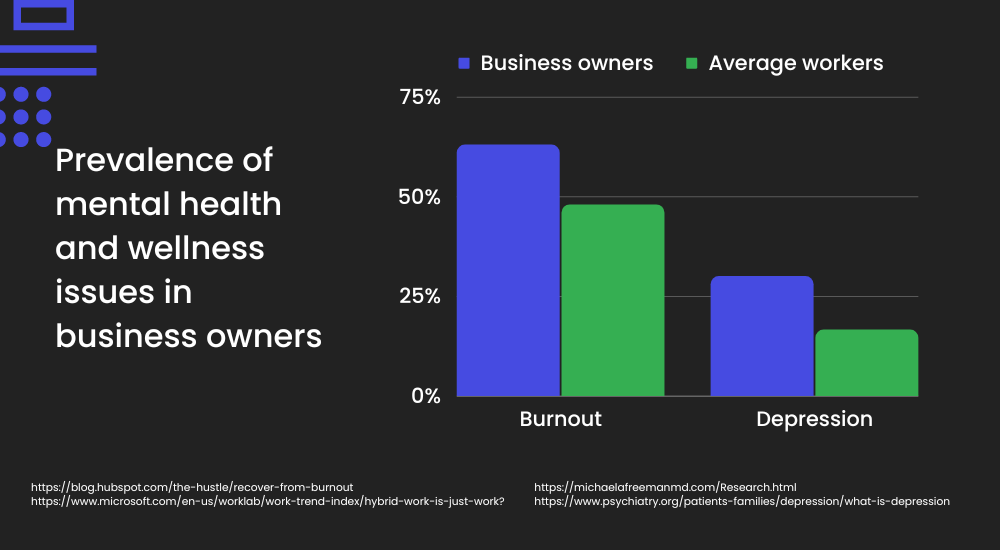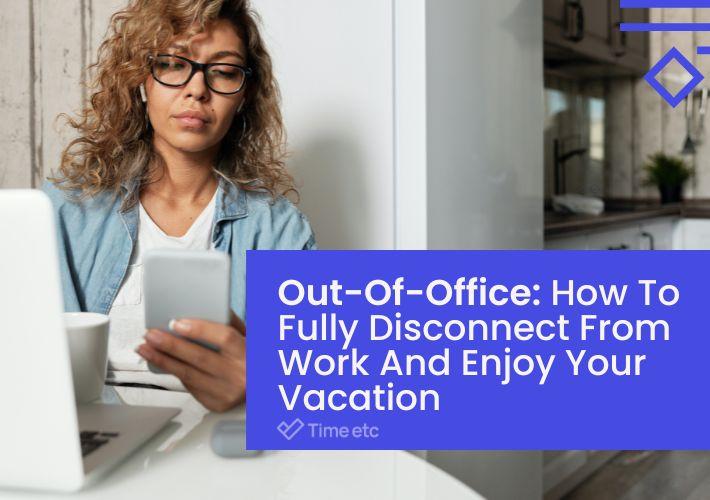Working for yourself can be both a blessing and a curse. On the one hand, you have almost complete control over your work life and the freedom to choose where and when you work. On the other hand, having no one to answer to means there’s no one above you to enforce firm start and stop times. This, coupled with the immense pressure to succeed, can make it all too easy to become consumed by work.
It's estimated that 86% of business owners work on weekends, 53% work on major holidays, and 60% take just one vacation a year (a staggering 75% will then work during their vacation). While dedication to your business is certainly commendable, neglecting time off can come at a serious cost.
Taking vacations isn't just about fun and leisure; it's crucial for your success. Research has shown that vacations play a pivotal role in reducing burnout, boosting energy and engagement, and improving your overall health and well-being, but simply packing your bag and walking out the door isn't enough.
It's essential to disconnect from work to fully recharge and enjoy the benefits that vacations provide.
What are the dangers of the "always-on" mentality?
Long hours in the office, working weekends, and “no time” for vacations may traditionally be seen as a badge of honor in the entrepreneurial world, but in reality, you’ll likely end up losing far more than you’d ever hope to gain—both at work and at home.
Being constantly tethered to work can lead to:
Mental wellness problems
According to occupational health experts, being an entrepreneur is one of the most stressful jobs you can have. A recent survey found that small business owners spend the equivalent of 17 full days a year worrying about their business outside of work.
Being exposed to higher levels of stress for greater periods of time on a consistent basis—around 50 hours per week compared to the national average of 34.3 hours—is a recipe for disaster for your mental health. No matter how driven or passionate you are about your business, no one is immune.

Physical health issues
It's no secret that running a business can be challenging enough on a good day, let alone when you're sick. And if you don't give yourself plenty of opportunities to rest and recharge, you'll eventually start to feel it in your physical health.
The impacts of overworking yourself—such as increased stress and not getting enough sleep—can open the door to various health issues, from headaches, skin conditions, and a weakened immune system, to cardiovascular diseases and gastrointestinal problems.
Decreased productivity
Paradoxically, while entrepreneurs may believe that working around the clock will lead to increased productivity, the opposite is often true. According to a recent study by Stanford University, productivity per hour declines sharply when a person works more than 50 hours a week. If a person exceeds 55 hours, productivity drops so much that working any further hours would be pointless.
Constantly pushing oneself to work without adequate breaks can lead to diminishing returns as fatigue sets in and focus wanes. Not only that, but prolonged exposure to stress also impairs decision-making abilities, creativity, and problem-solving skills, all of which are necessary to produce quality work.
Strained relationships
Entrepreneurs and small business owners who are always on the clock may find their personal relationships suffering as a result. Being mentally and emotionally preoccupied with work during family time or social gatherings can lead to feelings of neglect among your loved ones. Over time, this strain on relationships can lead to increased stress and a further decline in overall well-being.
Why are vacations essential for business owners?
It might sound counterproductive, but sometimes the best thing you can do as a business owner is... very little!
Taking a break from the daily grind can unlock many significant advantages for your business. Let's explore some of them.
Reducing burnout and restoring well-being
Constantly being immersed in work can drain your physical and mental energy, leading to exhaustion and decreased motivation.
Regular vacations help lower stress levels, alleviate fatigue, and improve overall mental health. It allows your mind and body to recharge, enabling you to return to work with renewed energy and enthusiasm. By giving yourself opportunities to disconnect, you create space for relaxation, reflection, and rejuvenation, which are crucial for maintaining long-term productivity and success.

Boosting energy, creativity, and engagement
For years, the “always-on” culture of entrepreneurship would have us believe that our schedules must be full to the brim with work in order to achieve the results we want. But if you asked some of the world’s most successful business owners, they would disagree.
Back in the 1980s, Microsoft founder Bill Gates began scheduling "think weeks" that he would spend in a secluded cabin in the woods. He says those weeks he spent away from the stresses and distractions of day-to-day life created the ideal conditions for him to develop the groundbreaking Internet Explorer in 1995.
Virgin founder Richard Branson also champions the benefits of taking time away from your workload, “Far too many people get weighed down in doing, and never take the time to think and feel. Take five minutes, an hour, a day, or even a holiday. If you free up some time to think freely, you’ll be able to see the bigger picture much easier.”
Vacations have a profound impact on energy levels, creativity, and engagement, all of which are vital for business success. When you take time off, you allow your brain to break free from routine and experience new environments and experiences. This change of scenery stimulates your mind, fostering fresh perspectives and new ideas.
Stepping away from work allows your brain to disengage from focused thinking and enter a state of "mind wandering." During this period, your subconscious mind can make connections and generate creative insights that may have eluded you previously.
See: The Top 10 Creativity Killers In Business (And How To Avoid Them)
Strengthening personal relationships
It's a sad reality that the demands of running a business mean that entrepreneurs often sacrifice personal relationships in the pursuit of professional success. However, vacations offer a valuable opportunity to reconnect with loved ones and nurture those important relationships. Spending quality time with family and friends during vacations strengthens bonds, improves communication, and enhances overall well-being.
Being fully present and genuinely engaged with your loved ones during your vacation creates lasting memories and experiences that go beyond work-related conversations. These shared moments foster a sense of connection and support, which can significantly contribute to your overall happiness and satisfaction in life.
How to disconnect from work during your vacation time
While the idea of taking vacations may be appealing, the fear of missing out on crucial business matters or the desire to stay on top of everything can make it hard for business owners to leave work at home.
But the truth is, experts agree that you can only experience the benefits of reduced burnout, increased energy, and improved overall well-being if you truly disconnect from work.
So to help you break free from the "always-on" mentality and fully enjoy your well-deserved vacation time, here's what you need to do:
Communicate your time off in advance
Before you set off on your vacation, make sure that all your direct reports are aware of your plans.
Block your vacation days out in shared calendars to create a clear visual reminder that you won't be available during this time, and agree with your senior team who will handle important but non-urgent inquiries in your absence.
And although your in-house team may now be aware of your plans, it's unlikely your external contacts will. Roughly two weeks before your vacation starts, add or amend an email signature to mention your upcoming vacation dates. This way, people you're corresponding with have a heads-up that you'll be unavailable and can plan accordingly.

Manage expectations
Again, your out-of-office auto-response message is an essential part of managing expectations during your vacation.
Use this opportunity to set and reinforce your boundaries for your time off. For example, if your message usually states that you’ll be “slow to respond during this time,” people will still expect a response. Instead, clearly state your absence dates and that you will not be reachable until you return.
Include contact information for relevant team members who can handle specific inquiries on your behalf while you’re away.
And if you use a communication channel like Slack, Zoom chat, or Microsoft Teams Chat, it's worth doing the same in your status there, too.
Draw the line
While the ultimate aim is to fully switch off from work while on vacation, you won't want to leave your team completely stranded in times of crisis. Letting your colleagues know they can contact you in an emergency can provide some much-needed reassurance.
However, without drawing a firm line around what counts as an "emergency" situation, you may find yourself drawn into more non-urgent matters when you should be enjoying your free time.
So one of the most important things to establish with your team is the circumstances under which you should be contacted. Not only will this significantly reduce the likelihood of you receiving distracting work messages, but it will also help put your mind at ease. As the saying goes, "No news is good news," so as long as you don't get that call, you can rest assured that everything is running smoothly.
Ditch your work devices
Technology has become deeply ingrained in our work and personal lives, blurring the lines between the two. Although it may be tempting to bring your devices on vacation in order to stay connected to your business, this temptation must be resisted.
Because no matter what we tell ourselves or others, having our work phone or laptop nearby can make us feel like we're still in some degree of "work mode". Opening your laptop to quickly check how things are going might seem harmless enough, but it's a slippery slope. Before you know it, you're sending work emails, posting on your company's Facebook, or filling in reports.
Leave your company devices behind, turn off work-related notifications, and log out of work-related apps or business social media accounts. Instead, focus on being present, connecting with loved ones, and giving your full attention to the experiences and activities your vacation has to offer.

Hire a virtual assistant (VA)
Just because you're not working, it doesn't mean that all your work has to come to a halt.
Delegating certain tasks and responsibilities can make all the difference in helping you disconnect from work while on vacation. Hiring a virtual assistant (VA) for your small business is a simple, cost-effective solution to help keep things ticking over while you're away.
A virtual assistant can handle a wide range of tasks, from managing emails and scheduling appointments to conducting research, managing social media accounts, and even helping you book your vacation! If it doesn’t require your specific knowledge or expertise and it would be possible for someone else to do it with the right instructions, chances are there'll be a VA who could take it off your hands.
See: How A Virtual Assistant Can Help With Your Travel Planning
Plan a catch-up day
Sitting back down at your desk and logging back in on your first day back at work can feel like being thrown in at the deep end—especially if you've been away for a few weeks.
The dread of not knowing what you'll return to, how many emails will be waiting in your inbox, or how much work has piled up is among the reasons why business owners don't take as many breaks as they should.
If possible, set the date you’re officially "back in work" as one day after you'd normally return to work following your trip.
This way, you have a full day to simply catch up on what you missed and refamiliarize yourself with what you’re working on so you can effectively plan how you'll tackle your workload for the rest of the week. This helps you ease back into the swing of things without the stress of having to race against the clock trying to clear any backlogs before you can resume your normal workflow.
It's important that you don't sacrifice your free time to get your work under control, so make sure your catch-up day takes place on an actual workday and not over the weekend or the final day of your vacation.
What's the bottom line?
By setting clear expectations, delegating tasks, creating effective out-of-office messages, establishing clear boundaries, and leaving your work devices behind, you can fully recharge and relax during your next vacation. Remember to prioritize your well-being and make the most of your time off to give the best version of yourself to your business when you return.
And if you need an extra set of hands to help manage your workload and restore your work-life balance, hiring a virtual assistant can help relieve the pressure and unlock those benefits all year round.
If you’re ready to start getting more done each day without compromising on the things that matter, Time etc is here for you. Our mission is to help hardworking and ambitious entrepreneurs take back control of their time by matching them with the best virtual assistants for their needs.
Speak to our team to get started, and we’ll set you up with a dedicated professional that’s ready to tackle those tedious and time-consuming tasks that are holding you back.
Or try a skilled virtual assistant for free today!











